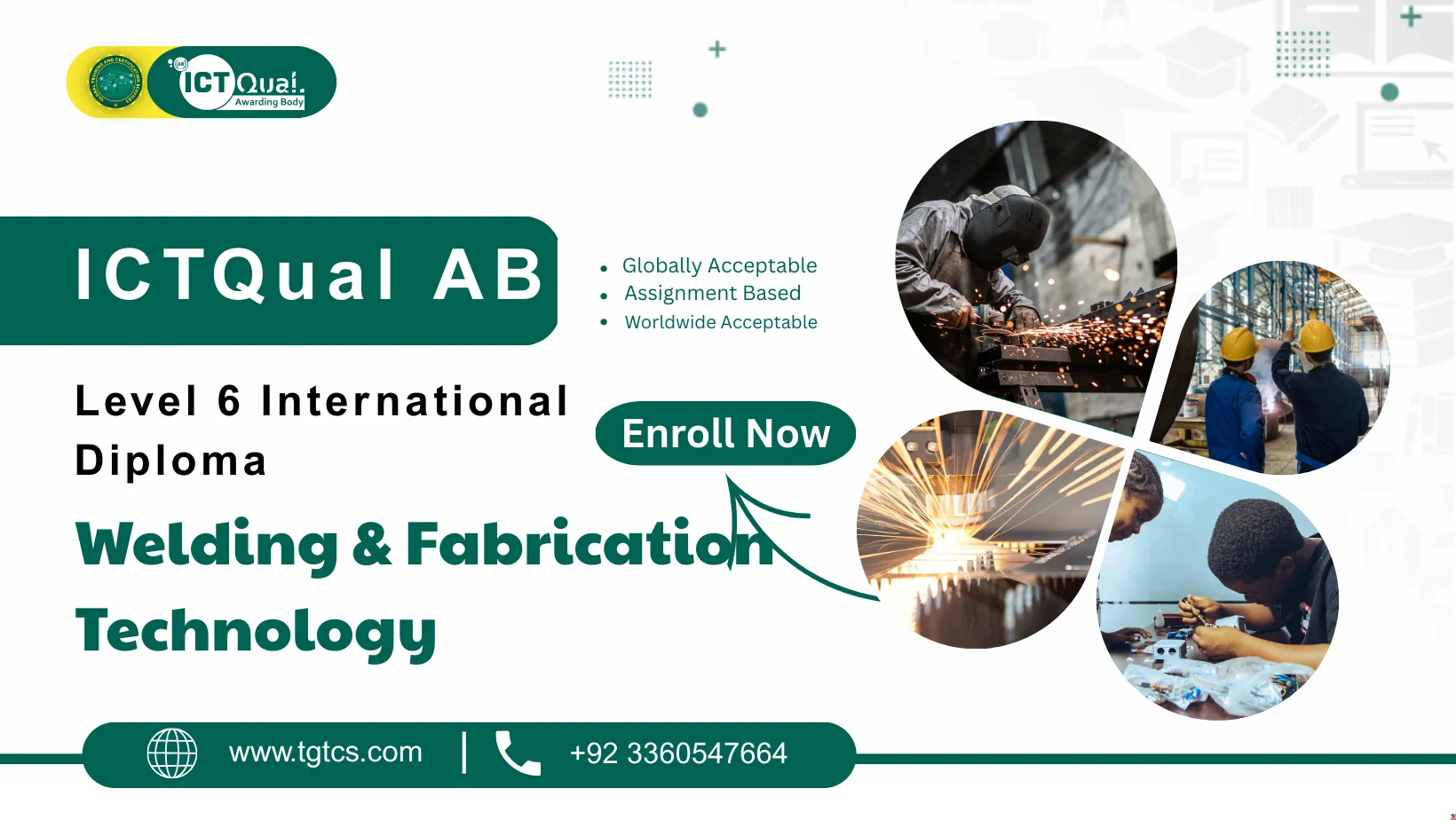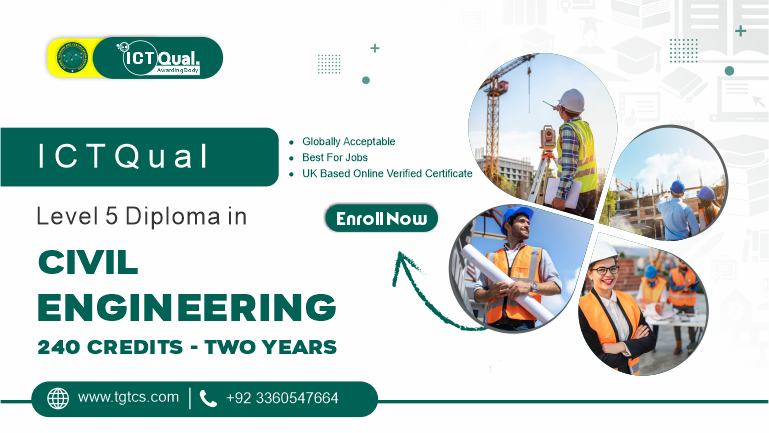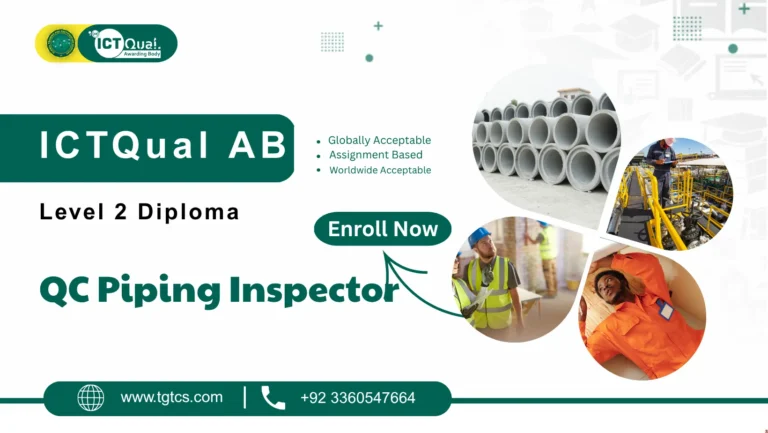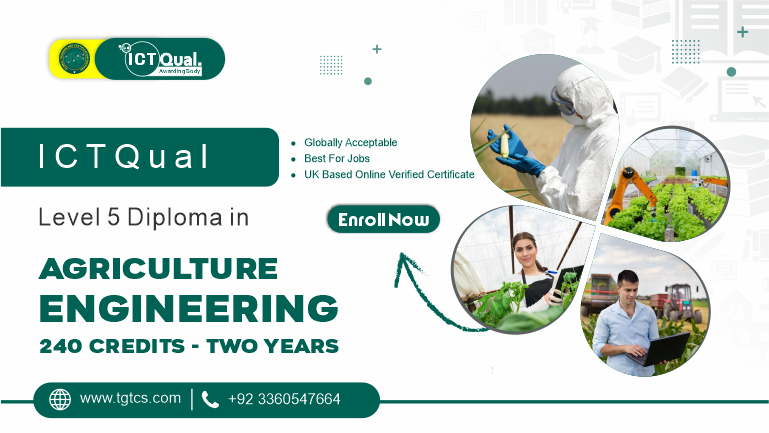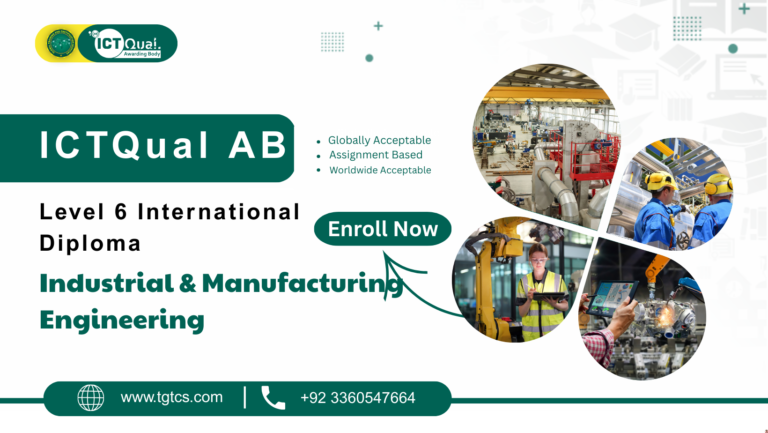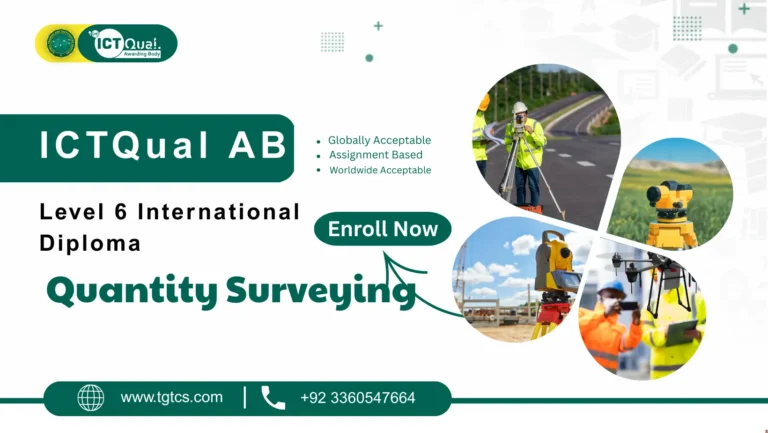ICTQual AB Level 6 International Diploma in Welding & Fabrication Technology
The ICTQual AB Level 6 International Diploma in Welding & Fabrication Technology is a globally recognized qualification designed to prepare learners for advanced careers in the welding and fabrication industry. With the growing demand for skilled professionals in oil and gas, construction, manufacturing, shipbuilding, and heavy industries, this diploma provides the technical expertise and global credibility required to succeed in a competitive market.
The purpose of this program is to develop in-depth knowledge of welding processes, fabrication techniques, metallurgical principles, and safety standards. Learners will explore essential topics such as welding inspection, quality assurance, fabrication design, advanced welding technologies, and industrial safety practices. By combining theory with practical application, the diploma ensures learners are fully equipped to handle real-world challenges in diverse engineering environments.
Through the ICTQual AB Level 6 International Diploma in Welding & Fabrication Technology, learners gain hands-on skills in metal joining, cutting processes, blueprint reading, and fabrication of structural components. The program also emphasizes problem-solving, project management, and leadership skills, empowering learners to manage complex fabrication projects and ensure compliance with international welding standards.
Graduates of this diploma are well-prepared to pursue careers as Welding Engineers, Fabrication Technologists, Quality Control Inspectors, and Project Supervisors in both local and international industries. With its British Council verifiable and MOFA/Embassy attested status, this qualification is highly valued for career advancement, job opportunities abroad, and iqama approval in Gulf countries.
The Global Training and Certification Services is Approved Training Centre of ICTQual AB UK Ltd
Course Level and Credits
Level 6 International Diploma, 360 credits.
Suitable for welding professionals, engineers, technicians, and students seeking advanced international qualifications in welding and fabrication technology.
Mode of Study
Fully assignment-based; learn at your own pace.
Accessible from anywhere in the world, flexible for working professionals and industry learners.
Global Recognition & Attestation
British Council verifiable, MOFA and Embassy attested.
Recognized worldwide for career advancement, overseas employment, and iqama approval in Gulf countries.
Scope and Purpose
Comprehensive coverage of welding processes, fabrication techniques, metallurgical principles, inspection methods, and safety standards.
Focus on both theoretical understanding and hands-on application in industrial welding and fabrication environments.
Skills and Knowledge Gained
Mastery of advanced welding methods, fabrication design, blueprint reading, and metal cutting processes.
Expertise in welding inspection, quality assurance, and compliance with international standards.
Leadership and project management skills for supervising fabrication projects.
Career Benefits
Opens pathways to roles such as Welding Engineer, Fabrication Technologist, Welding Inspector, and Project Supervisor.
Enhances employability in industries including oil & gas, construction, shipbuilding, manufacturing, and heavy engineering.
Target Audience
Welding professionals, engineers, supervisors, and students aiming to build careers in welding and fabrication technology.
Industry workers seeking globally recognized certification to advance their professional standing.
Unique Selling Points (USPs)
Flexible self-paced study, fully assignment-based program.
Prestigious and globally recognized Level 6 diploma.
Ideal for international job opportunities, professional recognition, and iqama approval.
Mandatory Unit
This qualification, the ICTQual AB Level 6 International Diploma in Welding & Fabrication Technology, consists of 36 mandatory units.
Year 1 – Foundation in Welding & Fabrication
- Introduction to Welding and Fabrication Technology
- Engineering Materials and Metallurgy
- Workshop Safety and Health Practices
- Basic Welding Techniques and Processes
- Metal Cutting and Shaping Methods
- Technical Drawing and Blueprint Interpretation
- Measurement and Quality Control in Fabrication
- Introduction to Welding Equipment and Tools
- Welding Metallurgy and Defects
- Fundamentals of Fabrication Design
- Industrial Mathematics for Fabrication
- Communication and Professional Skills
Year 2 – Intermediate Welding & Fabrication
- Advanced Welding Processes
- Gas Welding and Cutting Techniques
- Arc Welding and TIG/MIG Methods
- Welding Inspection and Testing
- Structural Fabrication Principles
- Sheet Metal Fabrication Techniques
- Welding Codes, Standards, and Regulations
- Welding Project Planning and Management
- Welding Metallurgy – Advanced Concepts
- Fabrication Automation and Machinery
- Health, Safety, and Risk Management in Welding
- Problem-Solving and Technical Decision Making
Year 3 – Advanced Welding & Fabrication
- Fabrication Design and Project Execution
- Advanced Structural Welding Techniques
- Pipe and Pressure Vessel Welding
- Welding Metallurgy – Failure Analysis
- Robotic Welding and Automation Technology
- Quality Assurance and Industry Standards
- Welding Project Management and Leadership
- Advanced Fabrication for Construction and Industry
- Cost Estimation and Resource Planning
- Research and Innovation in Welding Technology
- Capstone Project in Welding & Fabrication
- Professional Development and Career Planning
Year 1 – Foundation in Welding & Fabrication
Introduction to Welding and Fabrication Technology
- Understand the basic principles of welding and fabrication technology.
- Identify key applications of welding across industries.
- Explain the importance of fabrication in manufacturing and construction.
- Develop foundational knowledge of welding tools and processes.
Engineering Materials and Metallurgy
- Analyze the properties of metals and alloys used in welding.
- Understand metallurgical transformations during heating and cooling.
- Select appropriate materials for different fabrication projects.
- Assess how material properties affect welding performance.
Workshop Safety and Health Practices
- Apply health and safety regulations in welding workshops.
- Recognize workplace hazards and implement control measures.
- Use personal protective equipment (PPE) correctly.
- Promote a culture of safety in welding environments.
Basic Welding Techniques and Processes
- Demonstrate fundamental welding methods including SMAW and oxy-fuel.
- Apply correct welding parameters for various joints.
- Recognize common welding defects and corrective measures.
- Build confidence in handling basic welding assignments.
Metal Cutting and Shaping Methods
- Operate hand and machine cutting tools effectively.
- Apply thermal cutting methods such as oxy-fuel and plasma.
- Perform shaping techniques including bending, rolling, and shearing.
- Ensure accuracy and precision in cutting and shaping tasks.
Technical Drawing and Blueprint Interpretation
- Interpret fabrication drawings and technical sketches.
- Understand welding symbols and notation standards.
- Apply blueprint knowledge in planning fabrication projects.
- Develop accuracy in translating drawings into fabrication tasks.
Measurement and Quality Control in Fabrication
- Apply measurement tools for precise fabrication work.
- Implement quality assurance procedures in welding projects.
- Evaluate tolerances and dimensional accuracy.
- Document and maintain inspection records.
Introduction to Welding Equipment and Tools
- Identify types of welding equipment and their applications.
- Operate basic welding tools safely and effectively.
- Maintain welding machines for optimal performance.
- Select appropriate equipment for different welding processes.
Welding Metallurgy and Defects
- Understand metallurgical changes during welding.
- Identify welding defects such as cracks, porosity, and distortion.
- Apply corrective measures to prevent common defects.
- Correlate metallurgical principles with weld quality.
Fundamentals of Fabrication Design
- Understand principles of fabrication layout and design.
- Create simple fabrication designs using industry standards.
- Apply design considerations to improve strength and durability.
- Evaluate practical factors affecting fabrication feasibility.
Industrial Mathematics for Fabrication
- Apply basic algebra, geometry, and trigonometry in fabrication.
- Solve calculations related to welding joints and angles.
- Use mathematical formulas for measurement and cutting accuracy.
- Improve decision-making with quantitative data.
Communication and Professional Skills
- Demonstrate effective workplace communication.
- Develop teamwork and collaboration skills in welding projects.
- Apply professional ethics in industrial settings.
- Prepare technical reports and documentation.
Year 2 – Intermediate Welding & Fabrication
Advanced Welding Processes
- Master advanced welding methods such as GTAW, GMAW, and FCAW.
- Select appropriate welding techniques for different materials.
- Apply advanced process control to achieve quality results.
- Troubleshoot welding issues effectively.
Gas Welding and Cutting Techniques
- Operate oxy-fuel welding and cutting equipment.
- Apply correct flame types for different materials.
- Ensure safety during gas welding and cutting operations.
- Achieve precision in gas-based fabrication tasks.
Arc Welding and TIG/MIG Methods
- Apply arc welding techniques for industrial use.
- Demonstrate TIG/MIG welding with different electrodes and gases.
- Control heat input to prevent weld distortion.
- Produce defect-free welds with consistent quality.
Welding Inspection and Testing
- Conduct non-destructive and destructive testing methods.
- Identify and evaluate weld quality against standards.
- Document inspection results for compliance.
- Implement corrective action for weld defects.
Structural Fabrication Principles
- Understand load-bearing requirements in structural welding.
- Apply fabrication techniques for beams, columns, and frames.
- Ensure compliance with construction codes and safety standards.
- Integrate design considerations into structural fabrication.
Sheet Metal Fabrication Techniques
- Apply cutting, bending, and forming methods for sheet metal.
- Produce sheet metal components with dimensional accuracy.
- Select tools and machinery for different sheet metal projects.
- Implement quality checks in sheet metal fabrication.
Welding Codes, Standards, and Regulations
- Understand international welding codes and standards.
- Apply regulatory requirements in welding projects.
- Ensure compliance with occupational safety regulations.
- Maintain up-to-date knowledge of industry legislation.
Welding Project Planning and Management
- Plan welding projects from design to execution.
- Allocate resources effectively for fabrication tasks.
- Monitor timelines, budgets, and quality standards.
- Apply project management tools in welding contexts.
Welding Metallurgy – Advanced Concepts
- Analyze complex metallurgical reactions in welding.
- Study phase transformations in heat-affected zones.
- Apply knowledge of alloy behavior in advanced welding.
- Relate metallurgical concepts to defect prevention.
Fabrication Automation and Machinery
- Understand the role of automation in welding.
- Operate CNC and semi-automated fabrication systems.
- Evaluate benefits of automation in productivity.
- Apply safety protocols in automated fabrication environments.
Health, Safety, and Risk Management in Welding
- Conduct risk assessments in welding operations.
- Develop strategies to minimize welding-related hazards.
- Implement safety protocols for welding projects.
- Promote workplace health and safety culture.
Problem-Solving and Technical Decision Making
- Apply critical thinking in solving welding problems.
- Analyze technical challenges and propose solutions.
- Make informed decisions based on engineering data.
- Adapt to new fabrication challenges with innovation.
Year 3 – Advanced Welding & Fabrication
Fabrication Design and Project Execution
- Develop detailed fabrication designs and layouts.
- Manage end-to-end execution of fabrication projects.
- Apply modern software tools for design and modeling.
- Ensure project delivery within quality and time standards.
Advanced Structural Welding Techniques
- Perform complex welding for large-scale structures.
- Apply techniques suitable for heavy industries.
- Ensure compliance with advanced welding codes.
- Troubleshoot issues in structural weld integrity.
Pipe and Pressure Vessel Welding
- Understand principles of pipe welding and fitting.
- Apply specialized welding techniques for pressure vessels.
- Ensure weld integrity under high stress and pressure.
- Meet international codes for piping and pressure systems.
Welding Metallurgy – Failure Analysis
- Investigate causes of weld failure.
- Apply metallurgical analysis for defect identification.
- Recommend preventive strategies for failure avoidance.
- Document findings in technical reports.
Robotic Welding and Automation Technology
- Operate robotic welding systems.
- Program robotic welders for repetitive tasks.
- Understand benefits of automation in mass production.
- Integrate robotics into industrial fabrication processes.
Quality Assurance and Industry Standards
- Implement quality assurance frameworks in welding.
- Ensure compliance with ISO and AWS standards.
- Apply quality audits to welding projects.
- Maintain documentation for industry certifications.
Welding Project Management and Leadership
- Lead teams in welding and fabrication projects.
- Apply project leadership strategies for efficiency.
- Develop problem-solving and conflict-resolution skills.
- Monitor performance and ensure project success.
Advanced Fabrication for Construction and Industry
- Apply advanced fabrication techniques for industrial needs.
- Integrate fabrication practices in construction projects.
- Evaluate challenges in industrial-scale welding.
- Optimize methods for efficiency and durability.
Cost Estimation and Resource Planning
- Estimate costs for welding and fabrication projects.
- Plan resource allocation effectively.
- Control budgets and reduce project expenses.
- Apply financial planning in industrial contexts.
Research and Innovation in Welding Technology
- Conduct research in welding and fabrication.
- Innovate new methods for efficiency and sustainability.
- Apply research findings to industrial challenges.
- Document and publish technical research.
Capstone Project in Welding & Fabrication
- Design and execute a full-scale welding project.
- Apply advanced knowledge and skills in fabrication.
- Demonstrate independent problem-solving capabilities.
- Present project outcomes professionally.
Professional Development and Career Planning
- Develop strategies for career growth in welding.
- Understand global opportunities in fabrication technology.
- Build a portfolio for professional recognition.
- Apply lifelong learning strategies for career success.
The ICTQual AB Level 6 International Diploma in Welding & Fabrication Technology is designed to equip learners with advanced technical expertise, practical fabrication skills, and leadership knowledge required in global industries.
Advanced Technical Expertise
- Gain in-depth knowledge of welding processes, fabrication design, and metallurgical principles.
- Master advanced techniques including robotic welding, pipe welding, and pressure vessel fabrication.
- Understand the application of international welding codes, standards, and safety regulations.
Global Recognition & Career Advancement
- British Council verifiable, MOFA and Embassy attested for global credibility.
- Recognized in Gulf countries and worldwide for job opportunities and iqama approval.
- Increases employability in oil & gas, construction, shipbuilding, and manufacturing industries.
Practical Skills & Hands-On Training
- Develop strong expertise in advanced welding techniques (MIG, TIG, Arc, and Gas).
- Learn structural, sheet metal, and industrial fabrication practices.
- Gain experience in inspection, testing, and quality assurance procedures.
Leadership & Project Management Skills
- Acquire knowledge of welding project planning, cost estimation, and resource management.
- Build leadership and team management skills for large-scale fabrication projects.
- Develop problem-solving and decision-making abilities in technical environments.
Industry-Relevant Learning
- Focus on automation, robotic welding, and modern fabrication machinery.
- Apply sustainable practices in welding and fabrication for long-term industry growth.
- Enhance innovation through research and advanced project execution.
The ICTQual AB Level 6 International Diploma in Welding & Fabrication Technology provides the perfect blend of technical knowledge, hands-on skills, and leadership capabilities. Whether you are aiming to advance your career, secure international employment, or specialize in advanced fabrication technologies, this globally recognized qualification ensures long-term professional success.
The ICTQual AB Level 6 International Diploma in Welding & Fabrication Technology is designed for learners and professionals who aim to build strong technical skills, enhance career opportunities, and gain global recognition in the welding and fabrication industry.
Engineering Students and Graduates
- Ideal for those pursuing a career in welding, fabrication, or mechanical engineering.
- Provides practical knowledge and international certification to complement academic studies.
Skilled Welders and Fabricators
- Designed for professionals who want to enhance their technical expertise and knowledge of advanced welding techniques.
- Helps learners qualify for supervisory and higher-level positions in fabrication industries.
Industry Professionals in Oil, Gas, and Construction
- Perfect for individuals working in industries where welding and fabrication play a critical role.
- Ensures learners gain globally recognized certification for career growth and mobility.
Career Changers and Aspiring Technicians
- Suitable for individuals seeking to transition into welding and fabrication careers.
- Offers flexible, assignment-based learning that can be completed at one’s own pace.
Managers and Supervisors in Fabrication Projects
- Valuable for those leading welding teams or managing fabrication projects.
- Enhances leadership, project management, and quality assurance skills.
The ICTQual AB Level 6 International Diploma in Welding & Fabrication Technology is not limited to welders alone but is also ideal for engineers, project managers, supervisors, and career changers. With its flexible study mode and global recognition, this program ensures learners achieve professional growth and international opportunities in diverse industries.
Course Overview
Course Level
Level 6
Course Units
36 Units
Credits
360
Duration
3 years
